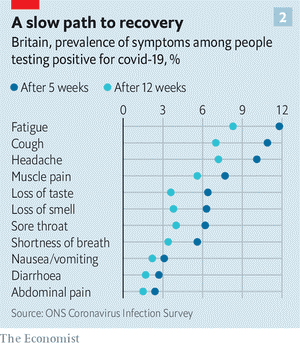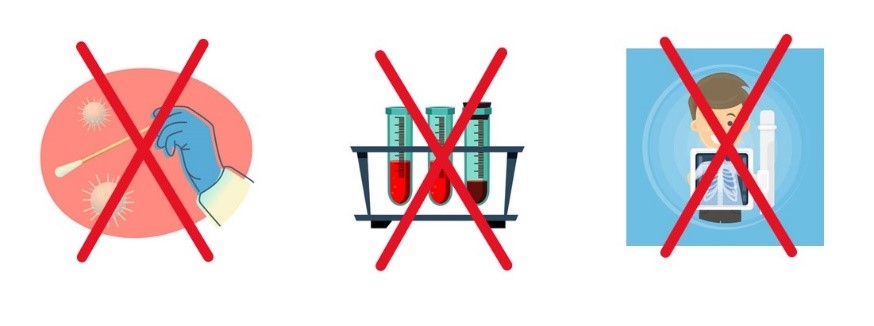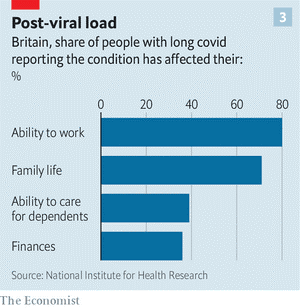After nearly two years of the pandemic, most of us know the list of telltale symptoms of a COVID-19 infection. We know that symptoms can range from mild (runny nose, headache) to severe (shortness of breath)1 and that we cannot always predict what anybody’s particular COVID symptoms will be; although those with certain comorbidities may experience worse outcomes from a COVID-19 infection.
Most of us may also have heard about the “other” kind of COVID, which has a less defined set of symptoms: Long COVID. Sometimes called “Long-haul” COVID, this post-viral syndrome affects some individuals who previously have had COVID-19. Health care providers, researchers, and patient advocacy groups are still collecting and studying data to better understand how Long COVID works and how to treat it. With New York City’s recent surge in COVID cases from the omicron and delta variants, Long COVID continues to be an ongoing and high-priority concern.
Since quite a bit of ambiguity and uncertainty surrounds this condition, Test & Trace Corner will address Long COVID in a two-part series. First, we will share the most current information we have about Long COVID, how it develops, and who can get it. In Part Two, we will address Long COVID in New York City and detail the resources Test & Trace Corps’ AfterCare program provides to individuals who have Long COVID.
What is Long COVID?
Long COVID is a wide range of new, returning, or ongoing symptoms that appear four or more weeks after someone is first infected with the virus that causes COVID-19. People that experience Long COVID have lingering symptoms after infection that can last for weeks or months after their recovery2. Long COVID can happen to anyone who has had COVID-19, even if their illness was mild. The symptoms of Long COVID persist or develop long after live virus can be detected by tests.
Symptoms vary greatly among individuals, but some of the most common symptoms that are very concerning for patients are shortness of breath, fatigue, and mental health issues including depression2. Many with Long COVID also report difficulty thinking or concentrating (“brain fog”), exercise intolerance, coughing, joint/muscle pain, loss of smell/taste, and a general lack of energy or stamina.
1 https://www.cdc.gov/coronavirus/2019-ncov/symptoms-testing/symptoms.html
2 https://www.cdc.gov/coronavirus/2019-ncov/long-term-effects/index.html

Source: “Researchers are closing in on Long COVID.” The Economist. 04/29/2021. https://www.economist.com/science-and-technology/2021/04/29/researchers-are-closing-in-on-long-covid
More severe health issues throughout different organ systems can also be associated with Long COVID, including problems with the heart, lungs, kidneys and brain. Since there is no lab test for Long COVID and because symptoms overlap with other common diseases, diagnosis depends on a discussion between doctor and patient, including a close look at the patient’s medical history.

Diagnosing Long COVID is challenging because there are currently no tests for it the way there are for other infections and diseases.
How long does Long COVID last?
The length of time symptoms persist varies from person to person. For some, Long COVID resolves on its own after several weeks or months. For others, their symptoms have gone on indefinitely. As we collect more data and more patients tell their stories, we will better understand how long we can expect Long COVID to continue in different people. Data can also help uncover the cause of Long COVID so that researchers and providers can develop new treatments or therapies to address it.

Source: “Researchers are closing in on Long COVID.” The Economist. 04/29/2021. https://www.economist.com/science-and-technology/2021/04/29/researchers-are-closing-in-on-long-covid
Who is at risk for Long COVID?
Anyone who has had COVID, regardless of whether they had symptoms, can get Long COVID – this includes children, people aged 65 and over, people who lead more active lifestyles, and even people without any pre-existing conditions.
Current estimates indicate that approximately one out of every three individuals who have had COVID-19 will go on to develop Long COVID in some form, making a comprehensive response essential going forward. With a significant percent of our country’s population affected by Long COVID, everything from our economy to our health care systems will be impacted.
One thing is certain: Long COVID decreases the quality of life for its sufferers. As we continue to recover from the COVID-19 pandemic, Long COVID has emerged onto the national and international stages as a constellation of symptoms that continue long after someone has recovered from the initial stages of COVID-19 illness—one that we still have much to learn about.
It is hoped that as we gather more data, effective treatments—and perhaps even a cure—will be found. At the moment, as with many chronic conditions, providing support to patients is paramount. NYC Health + Hospitals and the Test & Trace Corps’ AfterCare Program is working to focus on the populations most at risk and most in need of support for Long COVID. Part Two of this series will report on these efforts.
For more information on Long COVID and the resources available to support recovery, visit NYC Test & Trace’s AfterCare website.
If you think you or a loved one may be suffering from Long COVID, please reach out to one of NYC Health + Hospitals’ COVID-19 Centers of Excellence. 24-hour access to a health care provider is available.
For appointments, call 1 (844) NYC-4-NYC or 1-844-692-4692.
COVID-19 Centers of Excellence Tremont Location
NYC Health + Hospitals/Gotham Health, Tremont Community Health Center
1920 Webster Ave
Bronx, New York 10457
Hours of operation
Monday, Wednesday, Thursday: 8:30 AM – 7:00 PM
Tuesday, Friday: 8:30 AM – 5:00 PM
Saturday: 8:30 AM – 4:30 PM
COVID-19 Centers of Excellence Jackson Heights Location
NYC Health + Hospitals/Gotham Health, Roosevelt
37-50 72nd Street
Jackson Heights, NY
Hours of operation
Monday, Wednesday, Thursday: 8:30 AM – 7:00 PM
Tuesday, Friday: 8:30 AM – 5:00 PM
Saturday: 8:30 AM – 4:30 PM
COVID-19 Centers of Excellence Broadway Location
NYC Health + Hospitals/Gotham Health, Broadway
815 Broadway
Brooklyn, NY 11206
Hours of operation
Monday through Friday
9:00 AM – 4:00 pm
More from the Test & Treat Corner:
The Exposure Guidance Tool: A New Online Resource for New Yorkers Exposed to COVID-19